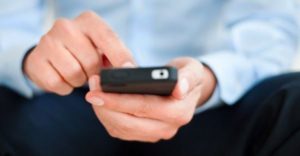 Mobile text messages are intended as brief chats. People don’t keep them and they are difficult to download anyway. Texting is a great way to confirm meetings, give quick bits of information, and to alert someone of immediate changes, particularly if you are running late to a meeting or phone call.
Mobile text messages are intended as brief chats. People don’t keep them and they are difficult to download anyway. Texting is a great way to confirm meetings, give quick bits of information, and to alert someone of immediate changes, particularly if you are running late to a meeting or phone call.
However, texting is not intended to replace emails. Emails are still best for sending business, legal, and other correspondence that could be kept for future reference and use. So whether texting for business or personal communications, please text in conjunction with email—not in lieu of—as many people think.
(Some time ago, I wrote an article on computer-based instant messaging. See this link to the Instant Messaging article. Many of the tips are equally good to follow when mobile texting: (Also at: https://www.advancedetiquette.com/2014/06/12-tips-for-instant-messaging-in-the-workplace/)
And now, my eight tips on texting:
1. Do not assume everyone has and uses text messaging: While most mobile phones have texting capabilities, not everyone uses text messaging, or uses it in the same way. They may not have a plan that allows for unlimited texting. Some plans charge by the word and text. Always ask before texting someone, “Joe, do you use and have an unlimited texting plan?”
(When I moved to Marin County from San Francisco, the only way I could keep the same business phone number was to port it to a cell number. I purchased a simple flip phone that has no texting capabilities. After all, it was simply to replace my former landline. Sometime later, a potential client called. She was most upset I wasn’t answering her texts. I had to explain that phone number didn’t have texting capabilities and that she mistook that number for my cell number. I gave her my cell number again and cautioned her to please only use email when sending me business information.)
2. Be bright, be brief, and be gone: Texting is not an appropriate platform to send sad news (as in breaking up with someone, or someone passing away), confidential or personal info, or information requiring several paragraphs. Keep texts on the bright side by using positive versus negative words. When your message needs to be longer, is more important, or business related, briefly text the person, saying: “Please see your email for a message about X.” Use separate texts to discuss different topics. As in any conversation, it’s not typical to ask several questions in one breath or paragraph. Same with texts.
3. Introduce yourself when sending new and infrequent texts. Unless you add a person to your address book, texting only shows a telephone number. At the onset, it’s always best to introduce yourself. Say, “Hello! It’s Syndi Seid from the office…” at the start, or sign your name at the end of the text. Also, include both your first and last name, and how you know each other.
4. Be careful with abbreviations, emojis, and slang. Use whole sentences with as few acronyms and other abbreviations as possible. When you do use them, make sure the receiver understands your “texting language” so he or she won’t misunderstand the message. The shorter and briefer your text, with fewer nouns and adjectives, the more likely it is to be misunderstood.
5. Here’s how to respond to wrong and spam texts. Alert the sender, saying: “Wrong number; please delete this number.” For spam ads, simply say, “STOP.” In this instance, all caps are a standard reply.
6. Do not expect immediate replies. Typically email has an acceptable response time of 12 to 24 hours. Texting replies are more immediate, often expected within minutes. However, many people feel they must reply within seconds… This is not true. It’s a compulsive behavior that is not necessary and should be stopped for the benefit of everyone. Gosh, how did we survive without texting in years past? We simply replied as soon as possible. Please do not become obsessed with your mobile phone at the expense and exclusion of being with others. Use mobile phones as just another helpful tool that is well-balanced among your many other activities. When you are working or meeting with others, remain focused on that activity, checking for messages every 60 minutes is within reason.
7. Texts are rarely that important. As a general guideline, never text when with others at dinner, meetings, a party, a movie theater, restaurant, etc. Do not allow yourself to be distracted. Turn the phone off, set it to vibrate, or enable an auto-responder to alert the sender you got the message and will reply as soon as possible.
8. Sometimes you need an urgent reply. Begin the text with “Please reply immediately” or “Urgent reply requested” and explain what you need. Be patient. The receiver may be busy and unable to reply. Hopefully with the proper heading, you can be better assured s/he will see it and reply as fast as possible.
Ultimate Reminder! Absolutely no texting and driving! I am just as tempted as you to view my emails and texts while driving… especially when sitting in bumper-to-bumper traffic, crawling along inch-by-inch. Yet, I constantly have to remind myself, “Syndi, it’s not worth it… it can wait until I get home” or to a safe place to view the messages. We constantly hear about people dying in an accident because their smart phones distracted them from being fully alert when driving. Is it truly worth it? No! So please join me to Just Stop It!
Happy Practicing!

Well done! I am not a texter in any way, but wanted to read up…….again, well done!